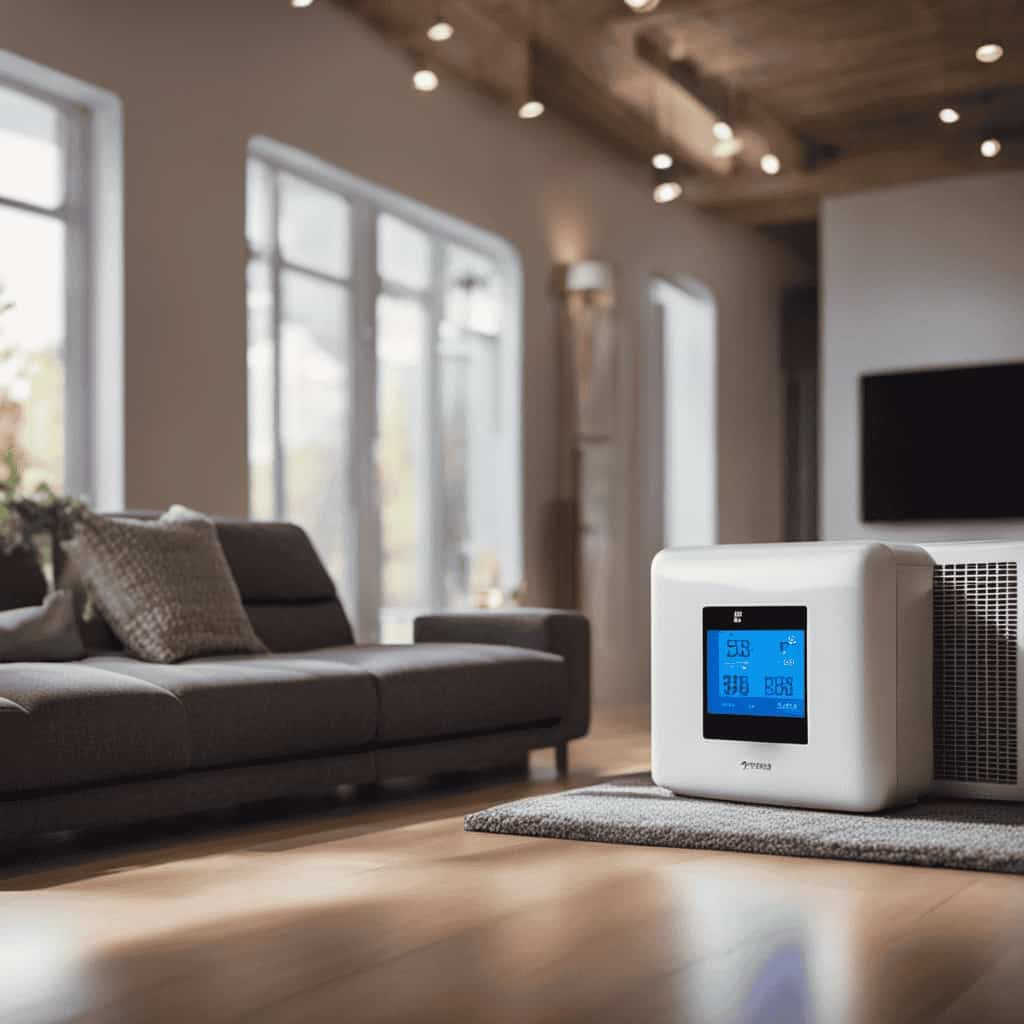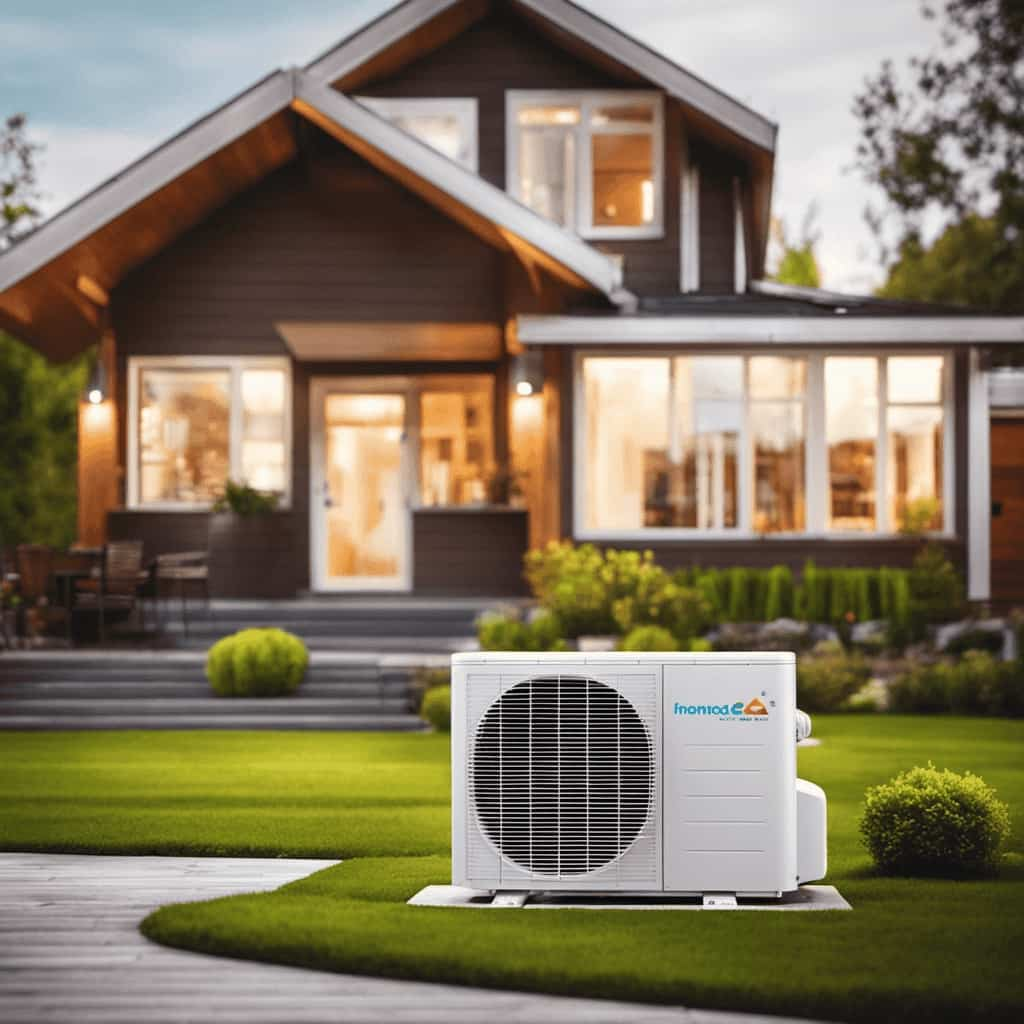Renewable Homes: Comparing Heat Pump Efficiency to Traditional Methods.
As we delve into the depths of heat pump efficiency, we embark on a journey through the world of renewable homes. We compare the prowess of heat pump efficiency to the tried and tested traditional heating methods.
Discover the advantages that await those who embrace heat pump efficiency in their renewable abodes. However, let us not forget the challenges and limitations that traditional heating methods present.
Join us as we unravel the complexities of implementing heat pump efficiency in the realm of renewable energy-powered homes.

Key Takeaways
- Heat pumps are highly efficient for heating and cooling homes, achieving efficiencies of up to 300%.
- Heat pumps consume less energy and significantly reduce heating costs compared to traditional methods like gas furnaces.
- Heat pumps have a lower environmental impact by using renewable energy sources and reducing greenhouse gas emissions.
- By embracing heat pump efficiency, homeowners can reduce their carbon footprint and contribute to a sustainable future.
The Basics of Heat Pump Efficiency
When it comes to heat pump efficiency, we need to understand the basics. Heat pump technology is a highly efficient way to heat and cool homes, offering significant energy savings compared to traditional methods.
A heat pump works by transferring heat from one location to another using a refrigerant. In heating mode, it extracts heat from the outside air or ground and transfers it indoors. Conversely, in cooling mode, it removes heat from indoor air and releases it outside. This process requires less energy compared to traditional heating and cooling systems because it doesn’t generate heat itself but rather moves it around.
Comparing Heat Pump Efficiency to Traditional Heating Methods
We can compare the efficiency of heat pumps to traditional heating methods by examining the energy savings they offer. When considering the cost effectiveness and environmental impact, heat pumps stand out as a superior choice. Here are four reasons why:
-
Energy Efficiency: Heat pumps can achieve efficiencies of up to 300%, meaning they produce three units of heat for every unit of electricity consumed. In contrast, traditional heating methods like gas furnaces typically have efficiencies around 90%.

-
Lower Operating Costs: Due to their higher efficiency, heat pumps consume less energy and can significantly reduce heating costs compared to traditional methods. This is especially true in regions with moderate climates.
-
Reduced Carbon Footprint: Heat pumps produce fewer greenhouse gas emissions compared to traditional heating methods, as they rely on electricity rather than burning fossil fuels. This contributes to a cleaner and greener environment.
-
Long-Term Savings: While heat pumps may have a higher upfront cost, their energy savings over time can outweigh the initial investment, making them a financially wise choice in the long run.
Considering these factors, it’s clear that heat pumps offer both cost effectiveness and a reduced environmental impact compared to traditional heating methods.

Now, let’s explore the advantages of heat pump efficiency in renewable homes.
Advantages of Heat Pump Efficiency in Renewable Homes
To fully understand the benefits of heat pump efficiency in renewable homes, let’s explore the cost savings and environmental advantages they offer.
Heat pumps have the potential to significantly reduce energy consumption and save homeowners a considerable amount of money. Compared to traditional heating methods, heat pumps can achieve energy savings of up to 50%. This is because heat pumps extract heat from the surrounding air, ground, or water, rather than relying on the combustion of fossil fuels.
By using renewable energy sources, heat pumps have a lower environmental impact, reducing greenhouse gas emissions and reliance on non-renewable resources.

Furthermore, heat pumps can also provide cooling during the summer months, making them a versatile and efficient choice for renewable homes.
Challenges and Limitations of Traditional Heating Methods
Despite the widespread use of traditional heating methods, such as furnaces and boilers, they come with various challenges and limitations that can hinder their efficiency and environmental impact.
Here are some key challenges and limitations associated with traditional heating methods:
-
Energy inefficiency: Traditional heating methods often have low energy efficiency, resulting in higher energy consumption and increased costs.

-
Limited fuel options: Traditional methods typically rely on fossil fuels like oil, gas, or coal, which are non-renewable resources and contribute to carbon emissions.
-
Environmental impact: The burning of fossil fuels releases greenhouse gases and pollutants, contributing to climate change and air pollution.
-
Maintenance and lifespan: Traditional heating systems require regular maintenance and may have a shorter lifespan compared to heat pump systems.
Transition: Considering the challenges and limitations of traditional heating methods, it becomes evident that implementing heat pump efficiency in renewable energy powered homes can offer significant advantages.

Implementing Heat Pump Efficiency in Renewable Energy Powered Homes
Our research has shown that implementing heat pump efficiency in renewable energy powered homes can lead to significant energy savings.
Heat pumps are highly efficient devices that transfer heat from one place to another, making them an ideal choice for heating and cooling in renewable energy powered homes. By utilizing the renewable energy sources such as solar or wind power, heat pumps can greatly reduce carbon emissions compared to traditional heating methods.
Additionally, heat pumps offer cost savings in the long run. Although the upfront cost of installing a heat pump may be higher, the energy savings over time can outweigh the initial investment.
With their ability to efficiently convert renewable energy into heating and cooling, heat pumps are a promising solution for reducing carbon emissions and achieving cost savings in renewable energy powered homes.

Frequently Asked Questions
Are Heat Pumps Suitable for All Types of Homes?
Heat pumps have limitations and may not be suitable for all homes. Alternative heating options should be considered based on factors such as climate, insulation, and energy efficiency goals.
What Are the Main Factors That Affect the Efficiency of Heat Pumps?
Factors affecting heat pump efficiency include ambient temperature, system size, insulation, and maintenance. Heat pumps offer benefits such as reduced carbon footprint and energy savings, making them an efficient choice for renewable homes.
Is It Possible to Use a Heat Pump as the Sole Heating Source in Extremely Cold Climates?
In extremely cold climates, the reliability of heat pumps as the sole heating source can be impacted due to the strain on their performance. Extreme cold can reduce heat pump efficiency and effectiveness.
How Does the Cost of Installing and Maintaining a Heat Pump Compare to Traditional Heating Methods?
When comparing the cost effectiveness and environmental impact of heat pumps versus traditional heating methods, it is important to consider installation and maintenance expenses. Data analysis reveals that heat pumps can be more efficient and cost-effective in the long run.

Can Heat Pumps Be Integrated With Existing Heating Systems in Older Homes?
Heat pump integration with existing systems in older homes can be achieved through retrofitting. This process involves modifying the current heating system to accommodate the heat pump, ensuring efficient and cost-effective renewable energy usage.
Conclusion
In conclusion, heat pump efficiency offers significant advantages over traditional heating methods in renewable homes.
The data clearly shows that heat pumps are more efficient and cost-effective, resulting in lower energy consumption and reduced carbon emissions.
The implementation of heat pump technology in renewable energy powered homes is a game-changer, revolutionizing the way we heat our homes and contributing to a greener future.

Its impact is as immense as a tidal wave, sweeping away the inefficiencies of traditional heating methods.









